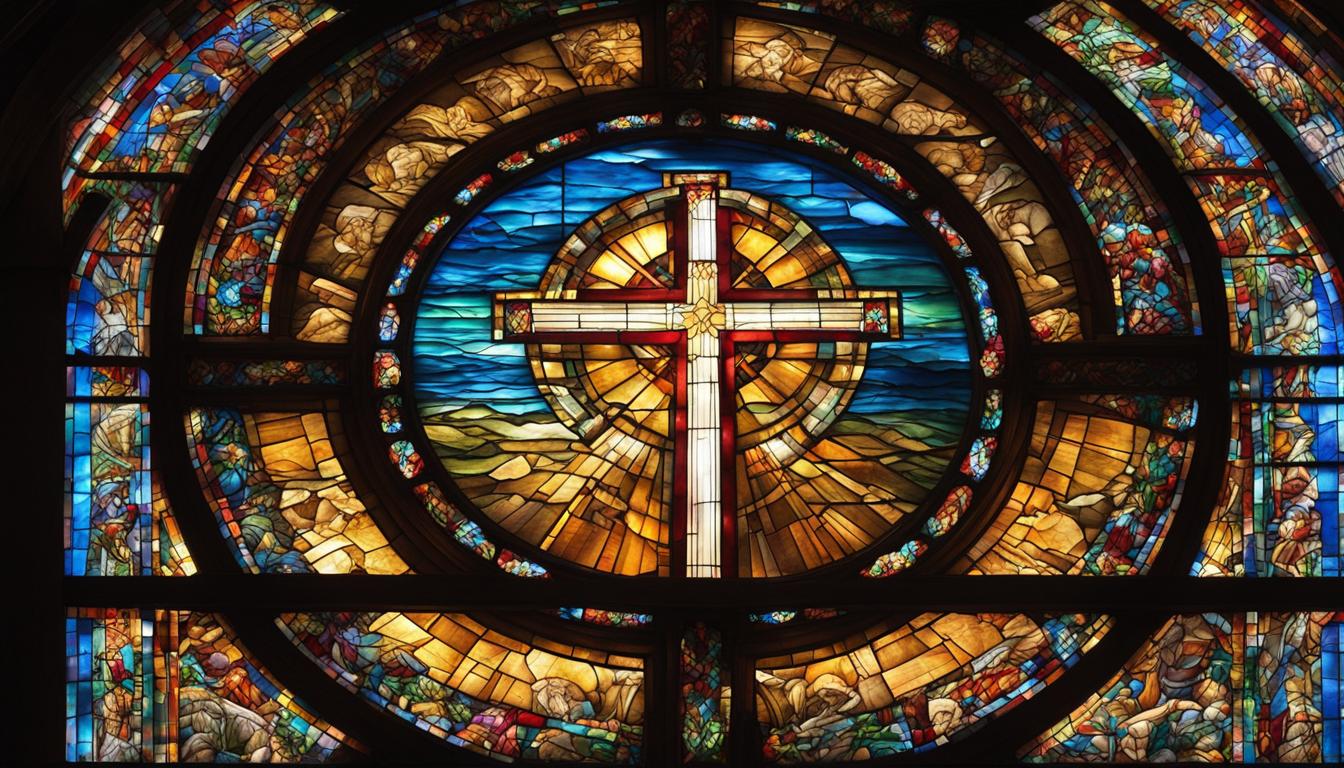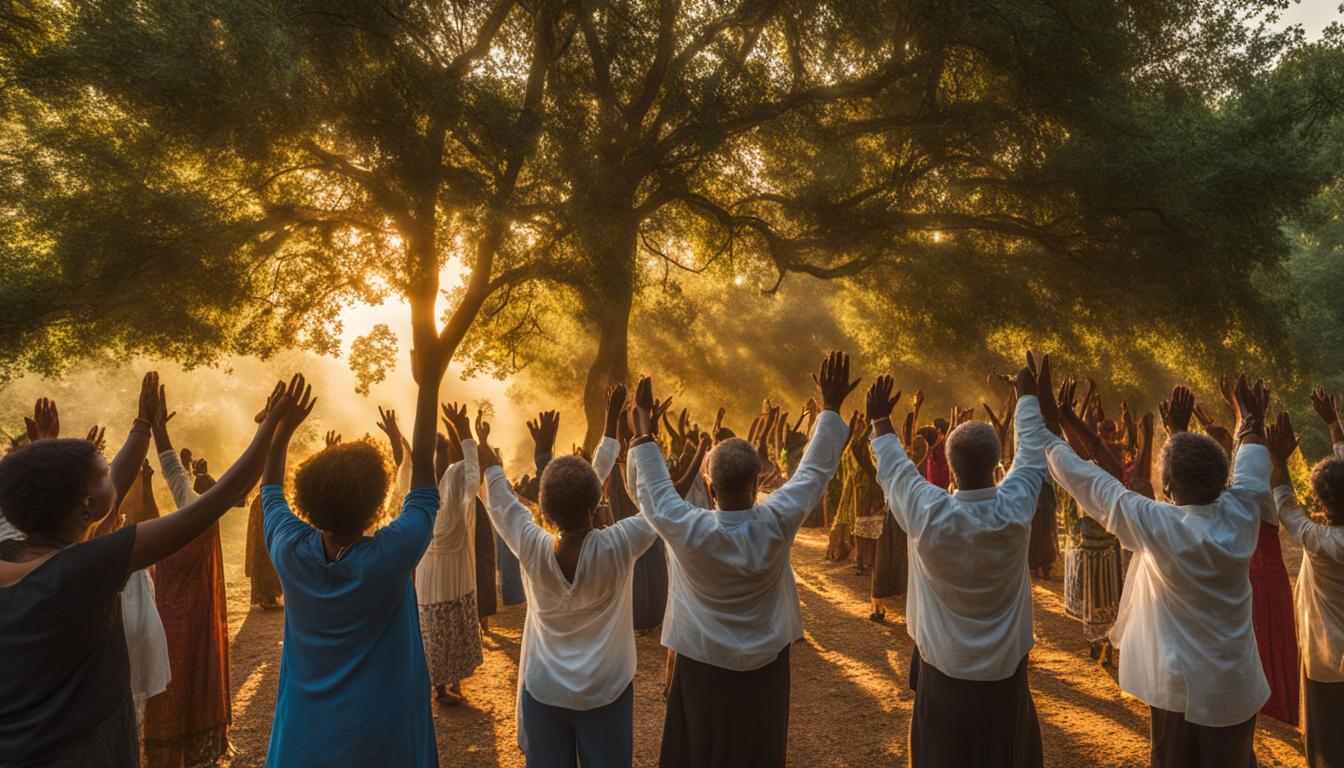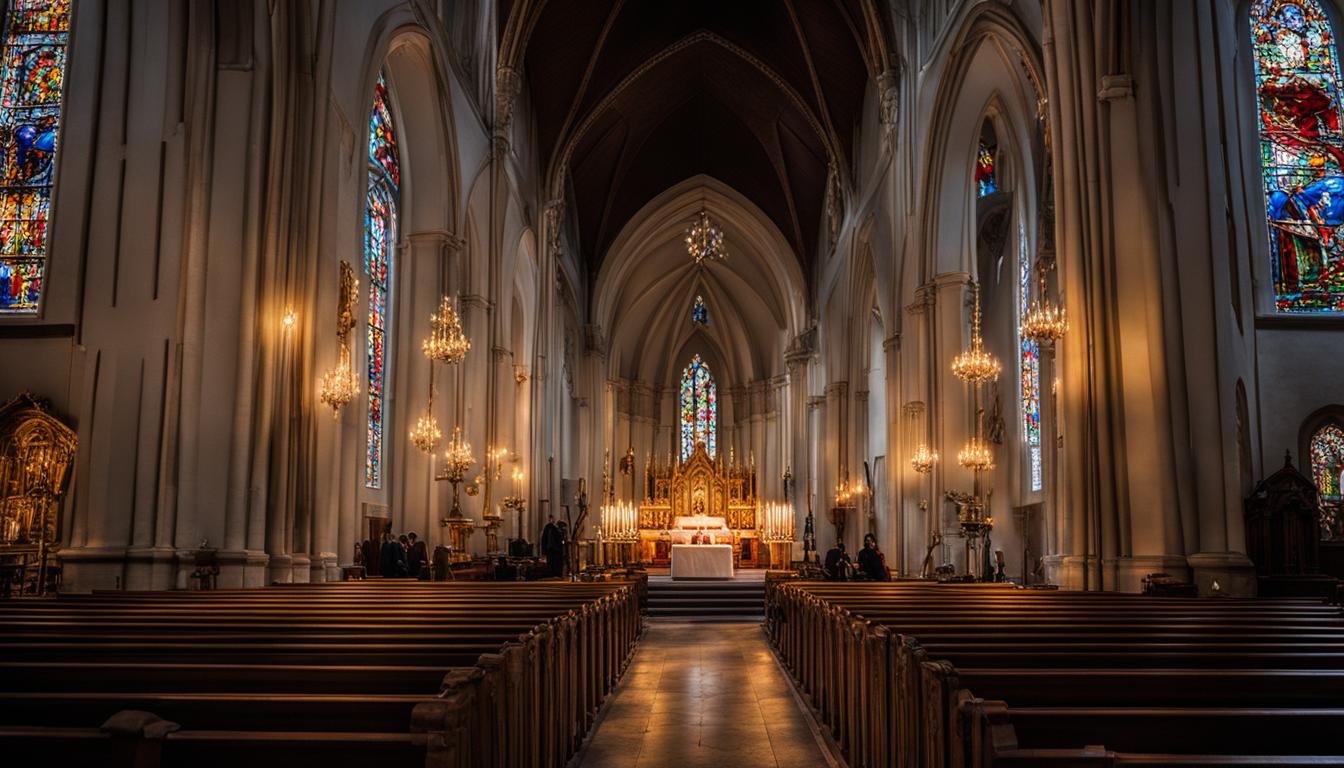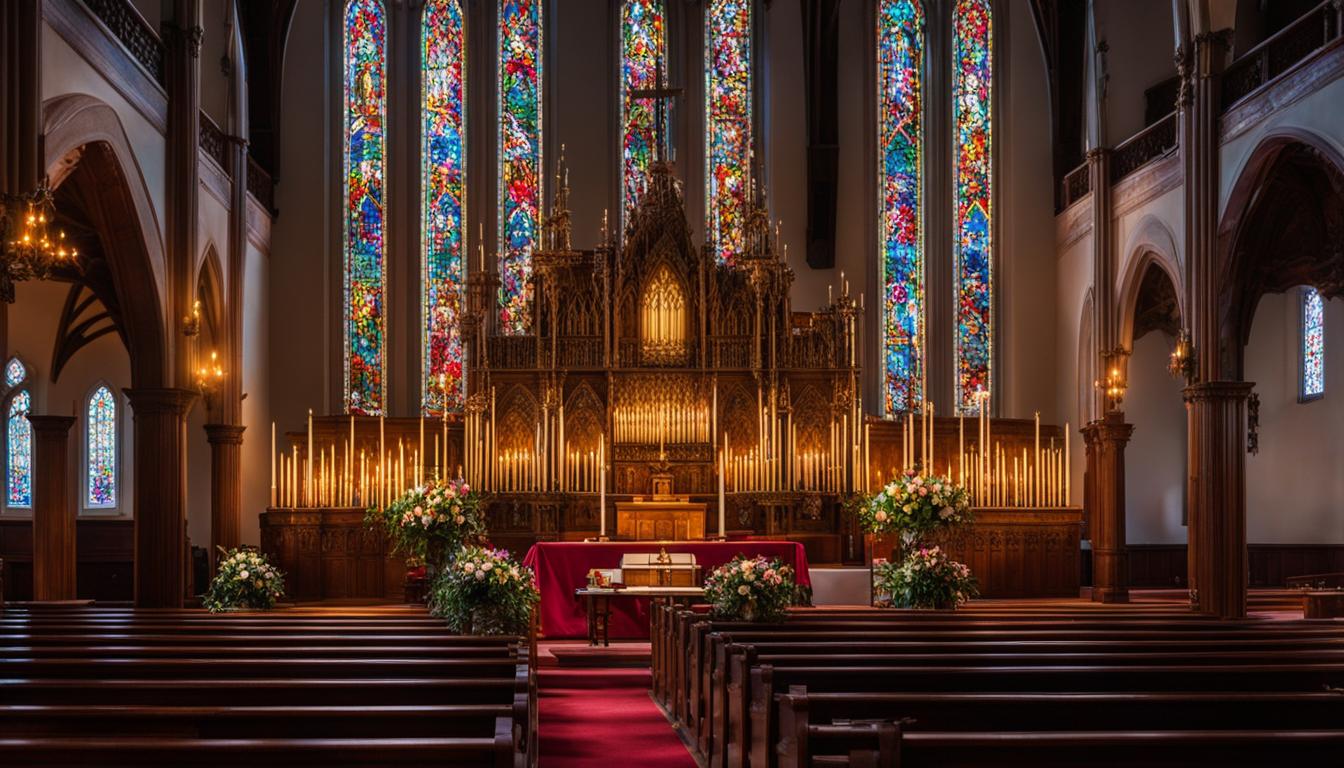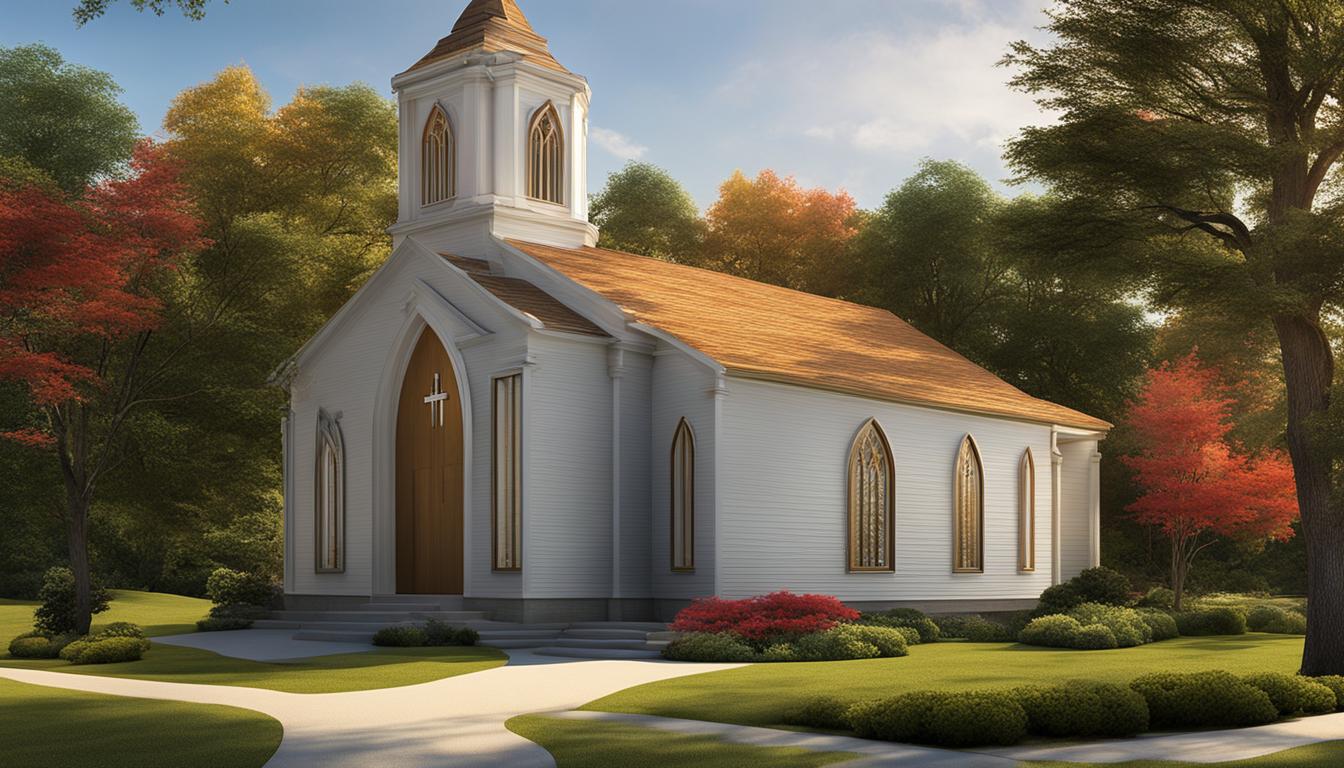Welcome to our in-depth exploration of the powerful role that music plays in worship experiences. Music has long been an integral part of worship, offering a means for people to connect with God, express praise and adoration, build community, and experience personal transformation. In this article, we will delve into the purpose of church worship and how music serves as a tool to achieve these purposes. Whether you are a worship leader, part of a worship team, or simply passionate about worship music, join us as we uncover the profound impact of music in worship services.
Key Takeaways:
- Music in worship serves as a means for people to connect with God on a deep level.
- Worship music provides structure and language for expressing praise and adoration to God.
- Music in worship brings people together, fostering a sense of community and unity.
- Through worship music, individuals can experience personal transformation and grow in their faith.
- Music plays a significant role in children’s worship, teaching theology and shaping their faith.
The Purpose of Church Worship: Communion with God
Church worship serves a primary purpose: to provide a way for the people of God to have communion with Him. This purpose encompasses connecting with God, engaging with Him mentally and spiritually, and experiencing His deep desire for intimacy with His children. The biblical foundations of worship emphasize the gathering of God’s people and their collective declaration of praise as a community of faith.
Understanding this theological basis for worship is crucial for those responsible for planning and leading worship, as it has a significant impact on the spiritual formation of a faith community. By recognizing that the purpose of church worship is communion with God, worship leaders can create an atmosphere that fosters a genuine connection with the divine.
To facilitate communion with God, worship music plays a vital role. It has the power to touch the human soul, providing a tangible and intangible means of communication and expression. Through music, believers can direct their attention towards God and engage in a meaningful exchange with Him. Music serves as a bridge that facilitates communion, enabling worshipers to experience a deep connection with the divine.
“Music has the power to touch the human soul and provide a tangible and intangible means of communion with God.”
Biblical Foundations of Worship
The biblical narrative accentuates the significance of gathering God’s people for worship and expressing praise as a community. In the Old Testament, we see the Israelites coming together to worship God through music, dance, and song. The Psalms, which were often sung in communal worship, are filled with expressions of praise, adoration, and gratitude towards God.
In the New Testament, we find examples of worship in the early Christian communities where believers gathered to worship and share in the breaking of bread. The book of Acts highlights the importance of the fellowship of believers and their devotion to worshiping God together. Additionally, the apostle Paul exhorts the believers to sing psalms, hymns, and spiritual songs as a means of expressing their love for God and edifying one another.
| Biblical Foundations of Worship | Key Scriptures |
|---|---|
| Gathering God’s People | Exodus 34:26, Psalm 22:22, Acts 2:42-47 |
| Expression of Praise | Psalm 100:1-5, Ephesians 5:19, Colossians 3:16 |
“Music serves as a bridge that facilitates communion, enabling worshipers to experience a deep connection with the divine.”
By understanding the biblical foundations of worship and the purpose of church worship as communion with God, worship leaders can create meaningful worship experiences that foster spiritual growth, community building, and personal transformation.
The Purpose of Church Worship: Praise and Adoration
Another important purpose of church worship is to provide structure and language for people to express praise and adoration to God. Worship is a pattern of revelation and response, where God reveals Himself and people respond with reverence, humility, and honor. Music, through words, songs, prayer, and actions of praise and adoration, offers a valuable vocabulary for worshiping God. It allows believers to love Him because He first loved them and gives them the opportunity to glorify Him through their worship.
Musical Language for Worship
Music in worship provides believers with a unique language to express their praise and adoration to God. Through hymns, songs, and prayers, worshipers can articulate their deep affection and gratitude for the Creator. The structure and language of worship music guide the congregation in lifting up their hearts and voices in unison, offering glory, honor, and praise to God.
“Let everything that has breath praise the Lord.” – Psalm 150:6
This verse from the Book of Psalms encapsulates the essence of worship, highlighting the universal call to praise the Lord. Music serves as a medium through which believers can fulfill this call by expressing their love, adoration, and awe for God. Whether through joyful songs of celebration or heartfelt melodies of surrender, worship music enables individuals to give their all to the One who is worthy of every ounce of praise and adoration.
The Power of Worship Music
Worship songs have a transformative power that goes beyond mere words and melodies. They have the ability to touch the depths of the human soul, stirring emotions and creating a profound connection with God. As worshipers engage in the music of worship, they are invited to experience the overwhelming presence of God and respond with awe, reverence, and surrender.
| Benefits of Praise and Adoration in Worship | Scripture Reference |
|---|---|
| Brings joy and gladness to the worshiper | Psalm 100:2 |
| Invites the presence of God | Psalm 22:3 |
| Strengthens faith and trust in God | 2 Chronicles 20:21-22 |
| Provides comfort and peace | Psalm 34:1-3 |
| Fosters a spirit of thankfulness | Colossians 3:16-17 |
Through praise and adoration in worship, believers are not only offering glory to God, but they are also nurturing their own spiritual growth. The act of worship opens hearts, brings healing, and allows individuals to enter into a deeper relationship with God. It is in this place of praise and adoration that lives are transformed and the beauty of God’s presence becomes manifest.
In the next section, we will explore another vital purpose of church worship: building community.
The Purpose of Church Worship: Building Community
One of the primary purposes of church worship is to build and strengthen community among believers. Worship serves as a powerful tool for edification, connecting individuals with one another and fostering unity and encouragement within the faith community. Through the shared experience of worship, believers are able to develop deeper relationships, support one another, and grow in their faith.
Worship music plays a significant role in building community during church services. As believers lift their voices together in song, they not only connect with God but also with one another. The act of singing in unison creates a sense of togetherness and shared purpose, fostering a bond among worshipers. Whether it is a contemporary worship song or a traditional hymn, music has a way of transcending differences and bringing people together.
Furthermore, worship music has the power to encourage and uplift the hearts of believers. As the lyrics and melodies resonate with the congregation, they provide a source of strength and inspiration. Whether through joyful and celebratory songs or songs that express vulnerability and longing, worship music creates a safe space for emotional expression and connection. In this way, music becomes a catalyst for building a community that supports and uplifts one another.
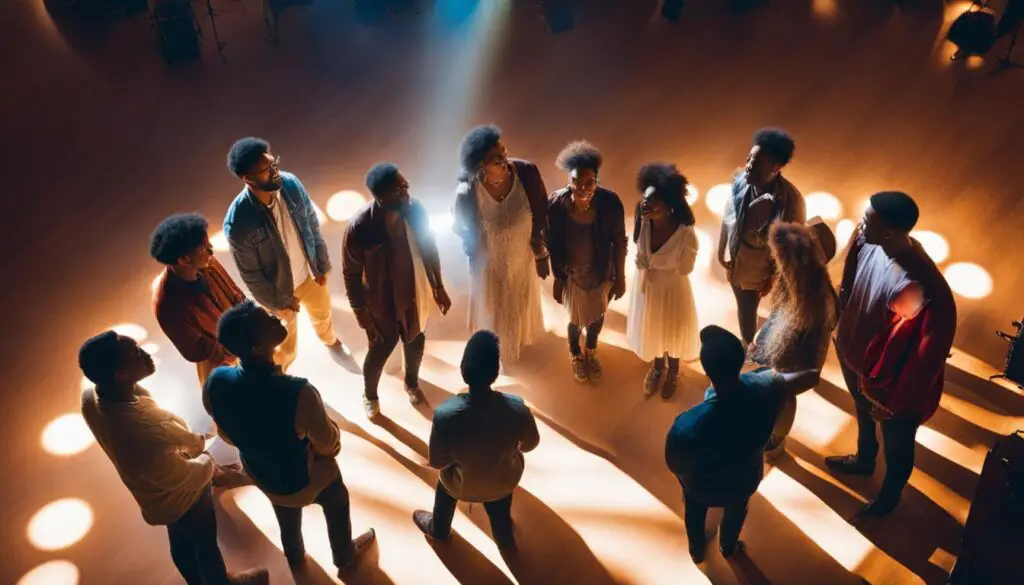
Quotes:
“Through worship, we find connection with one another, unity in our shared faith, and encouragement to walk the journey of faith together.” – Worship Pastor John Smith
“Music has this incredible ability to bring people together. It breaks down barriers, helps us see each other as brothers and sisters, and creates an atmosphere of love and unity.” – worshiper Sarah Johnson
Key Points:
- Worship builds and strengthens community among believers.
- Music in worship fosters unity and encouragement.
- Shared worship experiences create deeper relationships among worshipers.
- Worship music uplifts and inspires the hearts of believers.
- Through music, worshipers find emotional connection and support.
In conclusion, the purpose of church worship extends beyond individual spiritual growth. It encompasses the vital role of building community among believers. Worship music, with its power to foster unity, encouragement, and emotional connection, serves as a catalyst for creating a strong and supportive faith community. As believers gather together in worship, they not only commune with God but also with one another, forging deep relationships and mutual care. Through music, the church becomes a place where individuals can find a sense of belonging, support, and encouragement in their journey of faith.
The Purpose of Church Worship: Personal Transformation
Church worship serves a significant role in personal transformation, fostering discipleship and guiding individuals in imitating Christ and walking in the ways of God. Through worship, believers are not only called to encounter God’s presence but also to be shaped and transformed by it. It is a sacred space where hearts and minds are opened to receive fresh revelations of God’s character and truth, leading to a deepened commitment to living out the teachings of Jesus.
Discipleship is at the core of personal transformation within the context of church worship. As believers engage in worship “in spirit and in truth,” they are compelled to align their lives with the teachings of Christ and become active participants in making disciples. Music, as a powerful medium, plays a vital role in facilitating this transformative process. It stirs the heart, evokes emotions, and carries the message of faith, guiding individuals towards a deeper understanding of their identity in Christ and their purpose in the world.
In worship, believers are encouraged to surrender their lives and align their will with God’s, allowing His transformative work to take place within them. As they sing praises, offer prayers, and engage in moments of reflection, worshipers are invited into a deeper intimacy with God, where personal transformation becomes a natural outgrowth of encountering His presence. This transformative journey in worship involves not only individual growth but also the shaping of a faith community that collectively seeks to follow Christ’s example and impact the world around them.
Personal transformation through church worship is an ongoing process, requiring a commitment to continual growth and spiritual development. As believers engage in worship, they are invited to surrender their old ways of living and embrace the transformative power of the Holy Spirit. Through music, prayers, and the collective participation of the worshiping community, individuals are empowered to live out the teachings of Jesus and be ambassadors of His love, grace, and truth in their everyday lives.
The Role of Music in Church Worship: Communion with God
Music plays a crucial role in facilitating communion with God during worship experiences. It has the unique ability to connect deeply with the human soul, serving as a means of tangible and intangible communication and expression. Through the melodies, harmonies, and lyrics of worship songs, believers are able to establish a profound connection with the divine.
In the act of worship, music serves as a powerful medium for believers to express their love, devotion, and longing for God. It creates an atmosphere that invites individuals to direct their attention towards Him and enter into a space of spiritual intimacy. The rhythm and melodies of worship songs have the ability to engage the heart, mind, and spirit, allowing worshippers to encounter God in a personal and transformative way.
Moreover, music in worship provides a tangible vehicle through which individuals can experience the presence and guidance of God. It can evoke deep emotions, stirring the soul and facilitating a profound sense of connection with the divine. Whether it’s through the gentle strumming of an acoustic guitar or the powerful resonance of a full worship band, music has the power to transport worshippers into a place of communion with God.

Table: The Impact of Music on Communion with God
| Benefits of Music in Worship | Examples |
|---|---|
| Enhances the atmosphere of worship | Soaring anthems that inspire a sense of awe and reverence |
| Facilitates personal expression of devotion | Gentle and contemplative worship songs that invite personal reflection |
| Creates a space for encountering God’s presence | Energetic and uplifting worship songs that generate an atmosphere of joy and celebration |
| Deepens the spiritual connection with God | Harmonious congregational singing that unifies the body of Christ and reinforces a sense of community |
Overall, music serves as a powerful tool for facilitating communion with God in worship. It allows individuals to express their deepest longings, emotions, and adoration, creating a space for transformative encounters with the divine.
The Role of Music in Church Worship: Praise and Adoration
Music in worship plays a vital role in providing the vocabulary and actions necessary to express praise and adoration to God. It allows believers to proclaim His love and faithfulness, offering words, songs, and actions of worship. Through music, worshipers can engage in doxology, the act of offering praise to God through psalms, hymns, and spiritual songs. This becomes a natural response to the divine revelation encountered during worship.
When we sing songs of praise and adoration, we are not only expressing our love and devotion to God, but we are also reminding ourselves of His goodness and faithfulness. The lyrics and melodies of worship songs have the power to stir our hearts, lift our spirits, and draw us into a deeper communion with God. As we offer our words and songs of worship, we are invited to encounter the presence of God in a tangible and transformative way.
“Let the message of Christ dwell among you richly as you teach and admonish one another with all wisdom through psalms, hymns, and songs from the Spirit, singing to God with gratitude in your hearts.” – Colossians 3:16
As we engage in worship through music, we not only express our praise and adoration to God, but we also invite His presence to dwell among us. The power of music to connect with our hearts and emotions enables us to enter into a deeper level of intimacy with God. It is through this intimate connection that we can experience His love, receive His grace, and be transformed by His presence.
The Power of Doxology
Doxology, the offering of praise to God, holds a special place in worship. It is a way for us to declare the greatness of our God and acknowledge His worthiness of our adoration. Through doxology, we join our voices with the saints of old and the global church in a timeless act of worship.
| Key Elements of Doxology in Worship | Examples |
|---|---|
| Proclamation of God’s attributes | “Great is Thy Faithfulness” |
| Declaration of His deeds | “How Great Thou Art” |
| Expressions of gratitude and thanksgiving | “Blessed Be Your Name” |
| Acknowledgment of His holiness and majesty | “Holy, Holy, Holy” |
Doxology encompasses a wide range of expressions, from uplifting hymns to heartfelt worship choruses. It serves as a reminder of who God is and His faithful presence in our lives. Through songs of doxology, we can align our hearts with the truth of God’s Word and find comfort, inspiration, and encouragement in His everlasting love.

The role of music in church worship extends beyond mere entertainment or performance. It is a powerful medium through which we can express our praise and adoration to God. Whether through the lyrics, melodies, or actions of worship, music enables us to connect with the divine and encounter the transformative presence of God. As we engage in doxology, we join the global worshiping community in declaring the greatness of our God and experiencing the fullness of His love.
The Role of Music in Church Worship: Emotional Engagement
Music in worship has a profound impact on emotional expression and mood matching, allowing worshipers to connect deeply with their emotions and experience a more profound engagement with God. The tonality, rhythm, and lyrics of worship songs can evoke a wide range of emotions, from joy and celebration to introspection and reverence. The power of music lies in its ability to stir the heart and create a sacred space where individuals can express their deepest feelings and experiences.
When worship music matches the emotional tone of the service or the message being conveyed, it enhances the overall worship experience. For example, during a time of celebration and thanksgiving, upbeat and joyful songs can uplift the spirits and foster a sense of gratitude. On the other hand, during a time of reflection and repentance, meditative and contemplative music can create a reverent atmosphere that encourages self-examination and spiritual growth.
Furthermore, music in worship can also provide solace and comfort in times of sorrow or struggle. It allows individuals to connect with their pain and find healing through the expression of their emotions. Whether it’s through somber hymns that offer solace or powerful anthems that inspire hope, music has the ability to speak to the deepest parts of the human soul and provide a source of strength and encouragement.

In summary, the role of music in church worship is not limited to creating a pleasant melody or setting the mood. It goes much deeper, allowing worshipers to engage emotionally with their faith and connect with God in a profound way. By matching the mood of the music to the text and purpose of the service, worship leaders can create an environment where worshipers can fully express and experience the intended emotions. Through this emotional engagement, music becomes a powerful tool for worship, drawing individuals closer to God and fostering a deeper spiritual connection.
The Role of Music in Church Worship: Community Building
Music in worship plays a significant role in fostering community bonds and creating a sense of social connection among worshipers. Through the unifying power of music, voices blend together in harmony, allowing the congregation to participate in a shared experience. Singing together has been shown to release endorphins, which promote feelings of togetherness and unity.
Music also has the ability to connect believers across time, allowing them to participate in the same songs and share a common bond through music. When singing hymns or worship songs that have been passed down through generations, worshipers are not only connecting with their present community but also with the believers who have gone before them. This shared history strengthens the sense of belonging and deepens the spiritual connection within the worshiping community.
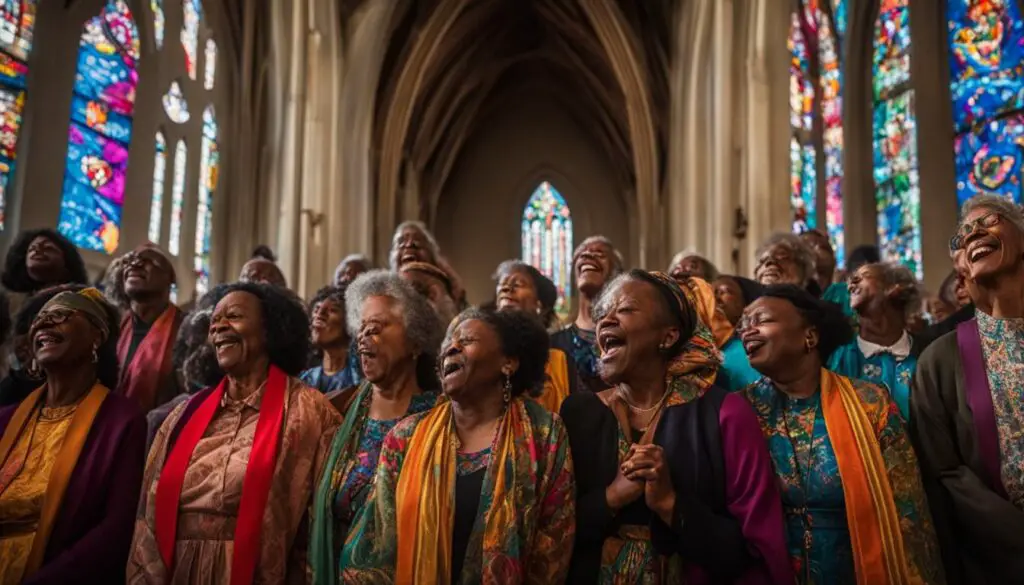
The Power of Singing in Community
“Singing together has a unique way of bringing people together. It transcends differences and creates a sense of belonging and unity.” – Worship Leader
When worshipers come together to sing, barriers and divisions fade away as the focus shifts to the collective act of worship. Singing in community allows individuals to set aside personal differences and unite in a shared purpose, creating a sense of belonging and strengthening the bonds between worshipers. The act of singing together in worship not only encourages community building but also fosters a deeper spiritual connection with each other and with God.
Furthermore, music in worship serves as a platform to express the diversity within the community. Different voices, talents, and cultural backgrounds can come together in harmony, showcasing the beauty of God’s creation and highlighting the unity found in diversity. It is through this celebration of diversity and unity that music in worship becomes a powerful tool for community building within the church.
| Benefits of Music in Community Building | Examples |
|---|---|
| Creates a sense of togetherness and unity | Collective singing in worship services |
| Strengthens the bonds between worshipers | Participating in choir or worship team |
| Connects believers across time | Singing hymns with a rich history |
| Celebrates diversity and unity | Showcasing different cultural expressions in worship |
In conclusion, music in church worship plays a crucial role in building and strengthening the sense of community within the congregation. Through collective singing and shared experiences, music unifies voices, fosters a sense of togetherness, and celebrates the diversity found within the worshiping community. The power of music in worship goes beyond the notes and melodies; it creates a space where believers can come together, form lasting connections, and grow in their faith as a community.
The Role of Music in Church Worship: Meditation and Prayer
Music in worship serves as a powerful tool for creating a meditative atmosphere, promoting internal peace, and facilitating prayer. When engaged in singing during the worship service, believers have the opportunity to focus their minds and hearts on God, allowing for deep contemplation and spiritual connection. Music becomes a form of meditation, a channel through which worshipers can express their devotion to God.
The soothing melodies and harmonies of worship songs create a calm and peaceful environment that encourages worshipers to enter into a state of reflection and communion with God. As the music resonates within the hearts of the congregation, it helps to quiet the mind and create a space for personal encounters with the divine. The act of singing becomes a form of prayer, as worshipers pour out their hearts and offer their praises to God.
“In the stillness of worship, as the music fills the air, we find ourselves drawn into a sacred space where we can connect with God on a deeper level. The melodies and lyrics become a bridge between our earthly existence and the heavenly realm, allowing us to experience the presence of God in a profound way.”
The Transformative Power of Music in Worship
Music in worship not only facilitates meditation and prayer but also has the power to transform lives. It stirs the soul, ignites passion, and inspires faith. When combined with heartfelt lyrics and a spirit of surrender, music has the ability to touch the deepest parts of our being and bring about spiritual transformation. It moves us from a place of introspection to one of surrender, enabling us to encounter the transformative presence of God.
The Beauty of Harmonious Melodies
In addition to its role in meditation and prayer, music in worship has the ability to create a sense of unity and harmony among worshipers. As voices join together in harmony, a beautiful tapestry of sound is woven, symbolizing the unity of the Body of Christ. In this collective expression of worship, divisions fade away, and the focus becomes solely on glorifying God. The harmonious melodies become a testament to the beauty and diversity of the Church as it joins together in worship.
| Benefits of Music in Worship | Scripture References |
|---|---|
| Facilitates meditation and internal peace | Psalms 46:10, 1 Timothy 2:8 |
| Enhances prayer and personal connection with God | Psalms 95:1-2, Colossians 3:16 |
| Transforms lives and inspires faith | Ephesians 5:19, James 5:13 |
| Fosters unity and harmony among worshipers | Psalms 133:1, Ephesians 4:3 |
The Role of Music in Children’s Worship
Music plays a significant role in children’s worship, providing a powerful medium to engage and shape their faith. Through music, children are not only entertained but also taught biblical theology and encouraged to connect with God. The use of storytelling in songs allows children to explore and understand complex concepts in a more relatable and accessible way.
One of the key benefits of incorporating music in children’s worship is its ability to teach theology. Singing songs that contain biblical truths helps children internalize important spiritual principles and develop a solid foundation of faith. By combining catchy melodies with meaningful lyrics, music captures children’s attention and makes theological concepts more memorable.
Engagement is essential in children’s worship, and music is a powerful tool to achieve that. Through lively and interactive songs, children are actively involved in the worship experience, fostering a sense of participation and connection with God. Singing together as a group creates a sense of unity and community among the children, enhancing their overall experience of worship.
| Songs | Themes |
|---|---|
| “Jesus Loves Me” | God’s love and care for every child |
| “This Little Light of Mine” | Being a light for Jesus and sharing His love |
| “Deep and Wide” | God’s love and mercy that never runs out |
| “I’ve Got the Joy, Joy, Joy, Joy” | Experiencing joy in God’s presence |
Ultimately, music is a valuable tool in shaping the faith of children. It helps them develop a personal and meaningful relationship with God and provides a platform for expressing their love and devotion. By incorporating engaging and age-appropriate songs into children’s worship, we can create an environment where children feel connected, inspired, and equipped to grow in their faith journey.
Conclusion
In conclusion, music holds immense importance in worship experiences, serving as a key element in facilitating communion with God, expressing praise and adoration, building community, and fostering personal transformation. Whether through the powerful emotions evoked, the language of worship expressed through lyrics, or the unity created through collective singing, music plays a vital role in enriching the spiritual growth of individuals and the collective worship of the church community.
By providing a means for people to connect with God, engage with Him on a deep level, and experience His desire for intimacy, music serves as a bridge between the worshiper and the divine. It offers a vocabulary and actions for expressing reverence, humility, and honor, allowing believers to offer their worship and glorify God.
Furthermore, music in worship is a powerful tool for building community and encouragement. It unites believers at a heart level, fostering a sense of togetherness and unity. Through both amateur and professional expressions of worship, the presence of God is manifest, transforming the worship experience and building up His people.
In addition to its role in adult worship, music also plays a crucial role in children’s worship, shaping their faith from a young age and instilling a commitment to God. By engaging children through songs, storytelling, and teaching biblical theology, music creates an engaging and impactful worship experience for young hearts and minds.
FAQ
What is the purpose of church worship?
The purpose of church worship is to provide a means for people to have communion with God, to express praise and adoration, to encourage one another and build each other up, and to help change and transform the worshiper.
Why is music important in church worship?
Music plays a vital role in achieving the purposes of church worship. It serves as a tool for communion with God, a means of expressing praise, an avenue for building community, and a catalyst for personal transformation.
How does music facilitate communion with God in worship?
Music has the unique ability to connect deeply with the human soul, serving as a means of tangible and intangible communication and expression. It allows worshipers to engage with God on a mental and spiritual level, facilitating a meaningful exchange between the worshiper and the divine.
What role does music play in expressing praise and adoration to God?
Music provides the vocabulary and actions needed to express praise and adoration to God. It allows believers to proclaim His love and faithfulness, offering words, songs, and actions of worship. Through music, worshipers have the opportunity to glorify God and respond to His revelation.
How does music contribute to building community in church worship?
Music unites the congregation through collective singing, creating a sense of social connection and shared experience. Singing together fosters a feeling of togetherness and unity. Music also connects believers across time, allowing them to participate in the same songs and share a common bond through music.
How does music facilitate personal transformation in church worship?
Music in worship works hand in hand with discipleship, allowing individuals and the faith community to walk in the ways of God and imitate Christ. Worship should lead to a fresh revelation of God’s character and a deepened commitment to being ambassadors for Christ in the world.
How does music impact the emotions of worshipers?
The tonality and mood of music can impact the worshiper’s mood, facilitating a deeper emotional engagement. Selecting worship music that matches the text and purpose of the service allows the congregation to fully experience and express the intended emotions.
How does music create a meditative state in worship?
Music in worship can create a meditative state, promoting internal peace and facilitating prayer. Singing allows worshipers to focus their minds and hearts on God, providing a space for deep contemplation and spiritual connection.
What is the role of music in children’s worship?
Music holds a powerful role in children’s worship, capturing their attention and engaging them in worship experiences. Through songs, children can learn biblical theology, as singing activates both sides of the brain and facilitates concentration. Music helps shape children’s faith and instills a sense of commitment to God from a young age.
Why is music important in church worship overall?
Music plays a significant role in worship experiences, serving as a means of communion with God, expression of praise and adoration, building community, and facilitating personal transformation. It enables storytelling, strengthens community bonds, and provides a platform for emotional processing and meditation. Music is essential for spiritual growth in individuals and the collective worship of the church community.

